形容词做状语
- 格式:docx
- 大小:15.17 KB
- 文档页数:2
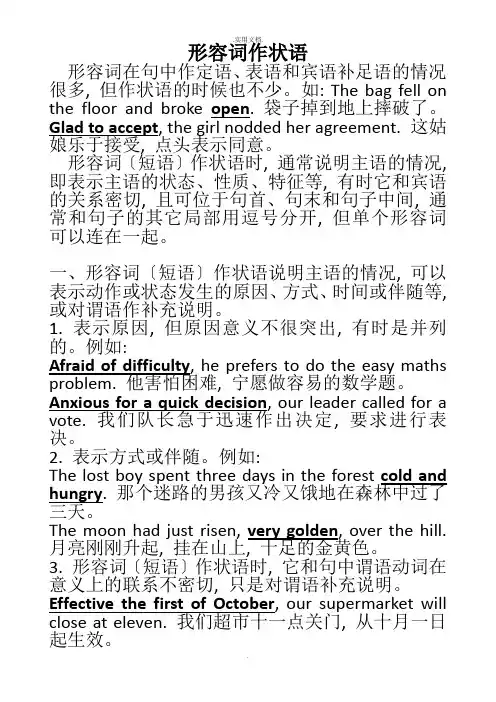
.实用文档.形容词作状语形容词在句中作定语、表语和宾语补足语的情况很多, 但作状语的时候也不少。
如: The bag fell on the floor and broke open. 袋子掉到地上摔破了。
Glad to accept, the girl nodded her agreement. 这姑娘乐于接受, 点头表示同意。
形容词〔短语〕作状语时, 通常说明主语的情况, 即表示主语的状态、性质、特征等, 有时它和宾语的关系密切, 且可位于句首、句末和句子中间, 通常和句子的其它局部用逗号分开, 但单个形容词可以连在一起。
一、形容词〔短语〕作状语说明主语的情况, 可以表示动作或状态发生的原因、方式、时间或伴随等, 或对谓语作补充说明。
1. 表示原因, 但原因意义不很突出, 有时是并列的。
例如:Afraid of difficulty, he prefers to do the easy maths problem. 他害怕困难, 宁愿做容易的数学题。
Anxious for a quick decision, our leader called for a vote. 我们队长急于迅速作出决定, 要求进行表决。
2. 表示方式或伴随。
例如:The lost boy spent three days in the forest cold and hungry. 那个迷路的男孩又冷又饿地在森林中过了三天。
The moon had just risen, very golden, over the hill. 月亮刚刚升起, 挂在山上, 十足的金黄色。
3. 形容词〔短语〕作状语时, 它和句中谓语动词在意义上的联系不密切, 只是对谓语补充说明。
Effective the first of October, our supermarket will close at eleven. 我们超市十一点关门, 从十月一日起生效。
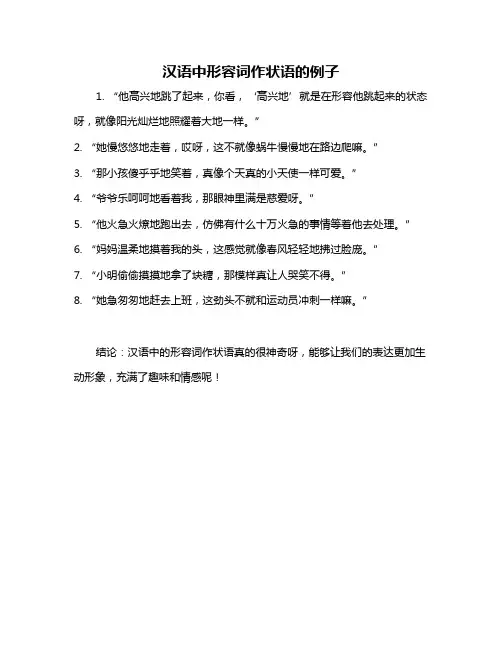
汉语中形容词作状语的例子
1. “他高兴地跳了起来,你看,‘高兴地’就是在形容他跳起来的状态呀,就像阳光灿烂地照耀着大地一样。
”
2. “她慢悠悠地走着,哎呀,这不就像蜗牛慢慢地在路边爬嘛。
”
3. “那小孩傻乎乎地笑着,真像个天真的小天使一样可爱。
”
4. “爷爷乐呵呵地看着我,那眼神里满是慈爱呀。
”
5. “他火急火燎地跑出去,仿佛有什么十万火急的事情等着他去处理。
”
6. “妈妈温柔地摸着我的头,这感觉就像春风轻轻地拂过脸庞。
”
7. “小明偷偷摸摸地拿了块糖,那模样真让人哭笑不得。
”
8. “她急匆匆地赶去上班,这劲头不就和运动员冲刺一样嘛。
”
结论:汉语中的形容词作状语真的很神奇呀,能够让我们的表达更加生动形象,充满了趣味和情感呢!。
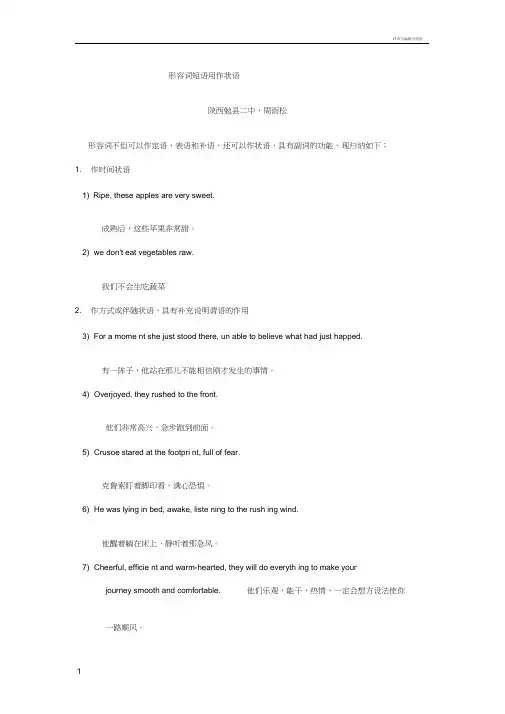
形容词短语用作状语陕西勉县二中,周雨松形容词不但可以作定语,表语和补语,还可以作状语,具有副词的功能。
现归纳如下:1. 作时间状语1) Ripe, these apples are very sweet.成熟后,这些苹果非常甜。
2) we don't eat vegetables raw.我们不会生吃蔬菜2. 作方式或伴随状语,具有补充说明谓语的作用3) For a mome nt she just stood there, un able to believe what had just happed.有一阵子,他站在那儿不能相信刚才发生的事情。
4) Overjoyed, they rushed to the front.他们非常高兴,急步跑到前面。
5) Crusoe stared at the footpri nt, full of fear.克鲁索盯着脚印看,满心恐惧。
6) He was lying in bed, awake, liste ning to the rush ing wind.他醒着躺在床上,静听着那急风。
7) Cheerful, efficie nt and warm-hearted, they will do everyth ing to make yourjourney smooth and comfortable. 他们乐观,能干,热情,一定会想方设法使你一路顺风。
3. 作原因状语8) Afraid of being scolded, for a moment, little Franz thought of playing truant. 害怕挨骂,小弗朗兹一时起了逃学的念头。
9) Easy to be with, he is warmly welcomed.他平易近人,所以很受人欢迎。
4. 作让步状语10) Every n atio n, big or small, should be equal.国家无论大小,都应一律平等。
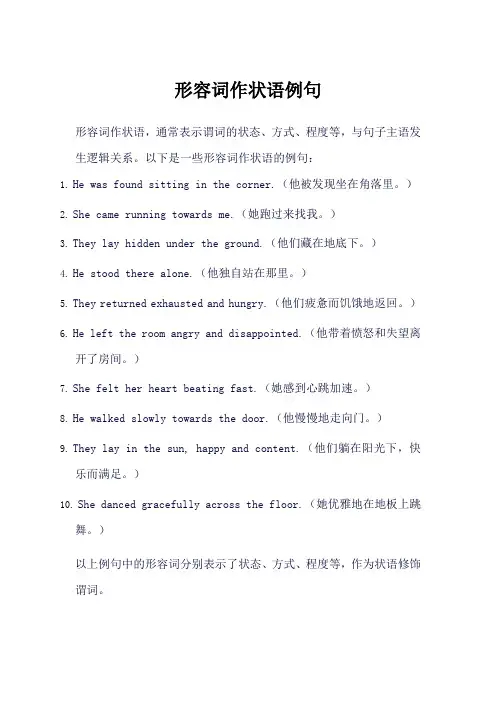
形容词作状语例句
形容词作状语,通常表示谓词的状态、方式、程度等,与句子主语发生逻辑关系。
以下是一些形容词作状语的例句:
1.He was found sitting in the corner.(他被发现坐在角落里。
)
2.She came running towards me.(她跑过来找我。
)
3.They lay hidden under the ground.(他们藏在地底下。
)
4.He stood there alone.(他独自站在那里。
)
5.They returned exhausted and hungry.(他们疲惫而饥饿地返回。
)
6.He left the room angry and disappointed.(他带着愤怒和失望离
开了房间。
)
7.She felt her heart beating fast.(她感到心跳加速。
)
8.He walked slowly towards the door.(他慢慢地走向门。
)
9.They lay in the sun, happy and content.(他们躺在阳光下,快
乐而满足。
)
10.She danced gracefully across the floor.(她优雅地在地板上跳
舞。
)
以上例句中的形容词分别表示了状态、方式、程度等,作为状语修饰谓词。
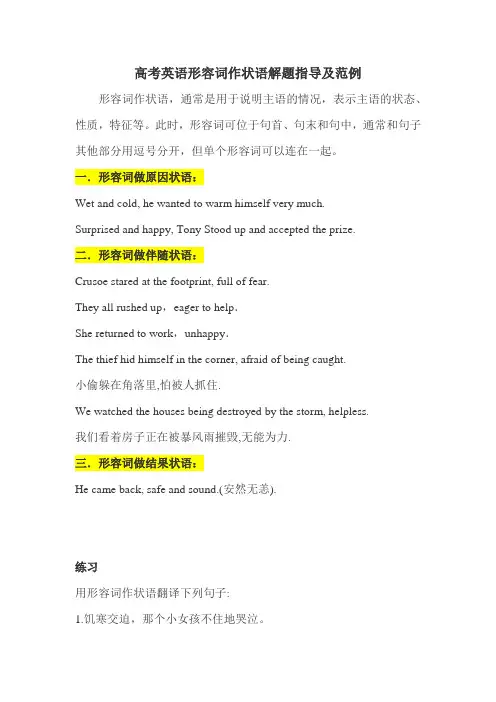
高考英语形容词作状语解题指导及范例形容词作状语,通常是用于说明主语的情况,表示主语的状态、性质,特征等。
此时,形容词可位于句首、句末和句中,通常和句子其他部分用逗号分开,但单个形容词可以连在一起。
一.形容词做原因状语:Wet and cold, he wanted to warm himself very much.Surprised and happy, Tony Stood up and accepted the prize.二.形容词做伴随状语:Crusoe stared at the footprint, full of fear.They all rushed up,eager to help.She returned to work,unhappy.The thief hid himself in the corner, afraid of being caught.小偷躲在角落里,怕被人抓住.We watched the houses being destroyed by the storm, helpless.我们看着房子正在被暴风雨摧毁,无能为力.三.形容词做结果状语:He came back, safe and sound.(安然无恙).练习用形容词作状语翻译下列句子:1.饥寒交迫,那个小女孩不住地哭泣。
2.长途国外旅行之后,他精疲力竭地回到了家。
3.他谦逊、开朗,使大家很快就一点也不紧张了。
4.在我回家的途中,我看到一个中年男子躺在路边,烂醉如泥。
5.回答不出老师的问题,学生们都保持沉默。
6.又怕又冷,时光旅游者踏上了回到现在的旅程。
答案:1.Cold and hungry,the little girl kept crying.2.After the long journey from abroad, he got home , tired/ tired out/worn out.3.Modest and easy-going, he soon put everyone at ease.4. On my way home, I saw a middle-aged man lying by the roadside , blind drunk./ very drunk.5.Unable to answer the teache r’s question,all the students kept silent.6.Scared and cold, the Time Traveller starts back towards the present.After the long journey, the three of the went back home, _______.A. hungry and tiredlyB. hungry and tiredC. hungrily and tiredlyD. hungrily and tired正确答案是:B。
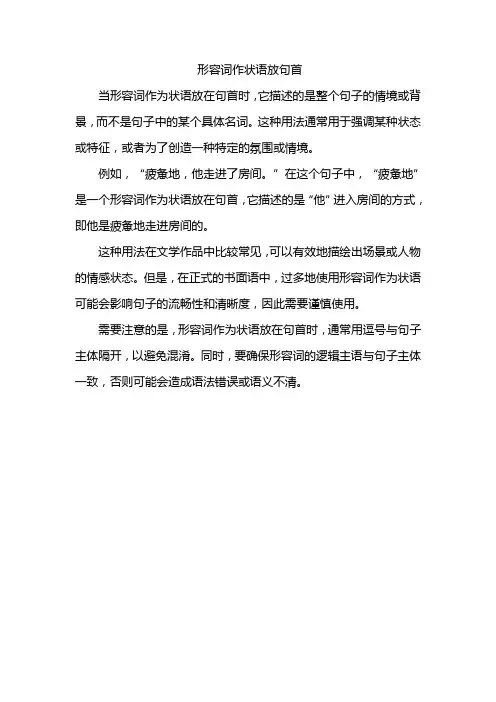
形容词作状语放句首
当形容词作为状语放在句首时,它描述的是整个句子的情境或背景,而不是句子中的某个具体名词。
这种用法通常用于强调某种状态或特征,或者为了创造一种特定的氛围或情境。
例如,“疲惫地,他走进了房间。
”在这个句子中,“疲惫地”是一个形容词作为状语放在句首,它描述的是“他”进入房间的方式,即他是疲惫地走进房间的。
这种用法在文学作品中比较常见,可以有效地描绘出场景或人物的情感状态。
但是,在正式的书面语中,过多地使用形容词作为状语可能会影响句子的流畅性和清晰度,因此需要谨慎使用。
需要注意的是,形容词作为状语放在句首时,通常用逗号与句子主体隔开,以避免混淆。
同时,要确保形容词的逻辑主语与句子主体一致,否则可能会造成语法错误或语义不清。
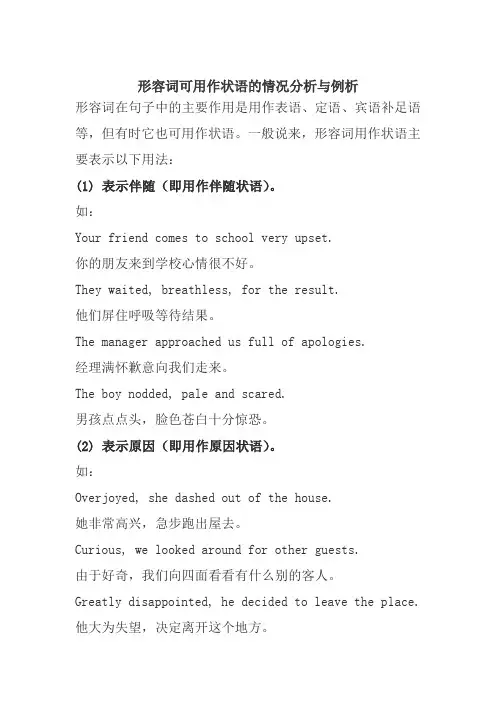
形容词可用作状语的情况分析与例析形容词在句子中的主要作用是用作表语、定语、宾语补足语等,但有时它也可用作状语。
一般说来,形容词用作状语主要表示以下用法:(1) 表示伴随(即用作伴随状语)。
如:Your friend comes to school very upset.你的朋友来到学校心情很不好。
They waited, breathless, for the result.他们屏住呼吸等待结果。
The manager approached us full of apologies.经理满怀歉意向我们走来。
The boy nodded, pale and scared.男孩点点头,脸色苍白十分惊恐。
(2) 表示原因(即用作原因状语)。
如:Overjoyed, she dashed out of the house.她非常高兴,急步跑出屋去。
Curious, we looked around for other guests.由于好奇,我们向四面看看有什么别的客人。
Greatly disappointed, he decided to leave the place. 他大为失望,决定离开这个地方。
Unable to afford bus fares, she walked to interviews. 由于没有钱坐公共汽车,她走路去参加面试。
(3) 表示结果(即用作结果状语)。
如:He emerged from the accident unharmed.他在车祸中没有受伤。
The children came home, tired and hungry.孩子们回到家里,又累又饿。
(4) 表示让步(即用作让步状语)。
如(兔笨笨英语网):Right or wrong, he always comes off worst in an argument because of his inability to speak coherently.由于讲话语无伦次,所以不论有理没理,他在辩论中的表现总是非常糟糕。
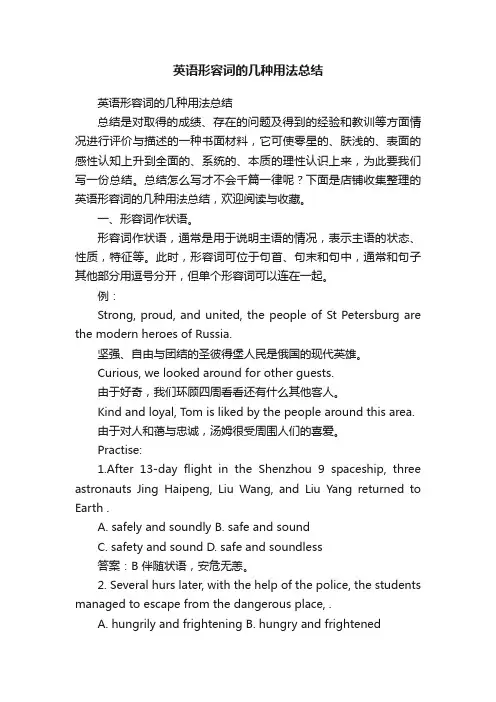
英语形容词的几种用法总结英语形容词的几种用法总结总结是对取得的成绩、存在的问题及得到的经验和教训等方面情况进行评价与描述的一种书面材料,它可使零星的、肤浅的、表面的感性认知上升到全面的、系统的、本质的理性认识上来,为此要我们写一份总结。
总结怎么写才不会千篇一律呢?下面是店铺收集整理的英语形容词的几种用法总结,欢迎阅读与收藏。
一、形容词作状语。
形容词作状语,通常是用于说明主语的情况,表示主语的状态、性质,特征等。
此时,形容词可位于句首、句末和句中,通常和句子其他部分用逗号分开,但单个形容词可以连在一起。
例:Strong, proud, and united, the people of St Petersburg are the modern heroes of Russia.坚强、自由与团结的圣彼得堡人民是俄国的现代英雄。
Curious, we looked around for other guests.由于好奇,我们环顾四周看看还有什么其他客人。
Kind and loyal, Tom is liked by the people around this area.由于对人和蔼与忠诚,汤姆很受周围人们的喜爱。
Practise:1.After 13-day flight in the Shenzhou 9 spaceship, three astronauts Jing Haipeng, Liu Wang, and Liu Yang returned to Earth .A. safely and soundlyB. safe and soundC. safety and soundD. safe and soundless答案:B 伴随状语,安危无恙。
2. Several hurs later, with the help of the police, the students managed to escape from the dangerous place, .A. hungrily and frighteningB. hungry and frightenedC. hungrily and frightenedD.hungry and frightening答案:B 排除AC,有副词3.When it was his turn to deliver his speech, , he walked towards the microphone.A. nervously and embarrassinglyB. nervous and embarrassedlyC. nervously and embarrassingD. nervous and embarrassed答案:D4. After visiting Expo 2012 Shanghai China, his parents returned with a lot of pictures, .A. tiredB. tiredlyC. tiringD. and tired答案:A5.—What has become of the ship?—It landed .A. safely but brokenB. safe but has brokenC. safely but was brokenD. safe but broken答案:D说明主语it的状况。
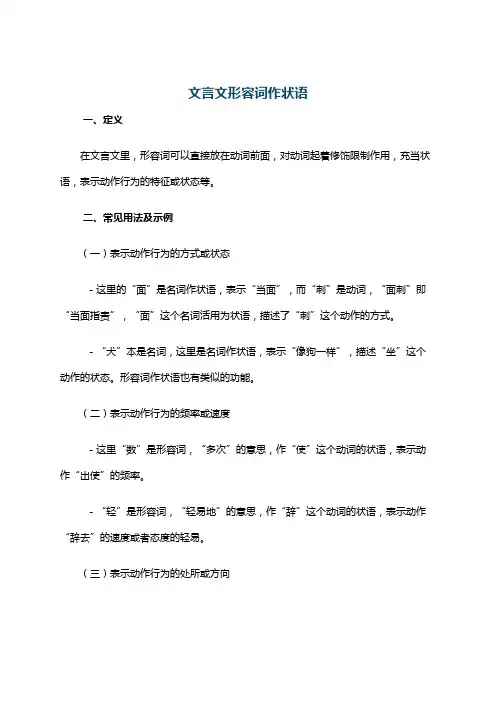
文言文形容词作状语一、定义在文言文里,形容词可以直接放在动词前面,对动词起着修饰限制作用,充当状语,表示动作行为的特征或状态等。
二、常见用法及示例(一)表示动作行为的方式或状态- 这里的“面”是名词作状语,表示“当面”,而“刺”是动词,“面刺”即“当面指责”,“面”这个名词活用为状语,描述了“刺”这个动作的方式。
- “犬”本是名词,这里是名词作状语,表示“像狗一样”,描述“坐”这个动作的状态。
形容词作状语也有类似的功能。
(二)表示动作行为的频率或速度- 这里“数”是形容词,“多次”的意思,作“使”这个动词的状语,表示动作“出使”的频率。
- “轻”是形容词,“轻易地”的意思,作“辞”这个动词的状语,表示动作“辞去”的速度或者态度的轻易。
(三)表示动作行为的处所或方向- “上”本是方位名词,这里可类比形容词作状语的用法,表示“在上面”,描述“蔽”这个动作发生的处所。
如果用形容词作状语表示类似的意思,如“远蔽”(这里是示例,非原文),“远”如果作状语,可表示“从远处”这样的处所或方向来修饰“蔽”这个动作。
- “内”是名词作状语,表示“在国内”,如果是形容词作状语来表示处所的话,例如“深立法度”(示例),“深”作状语可表示“深入地(在内部深处)”来修饰“立”这个动作。
三、识别方法1. 分析句子结构2. 结合语境理解语义四、与现代汉语的比较1. 现代汉语中形容词作状语的情况- 在现代汉语中,形容词也可以作状语,但在形式和用法上与文言文有一些区别。
例如“快走”中的“快”是形容词作状语,表示动作“走”的速度。
现代汉语中形容词作状语时,有时会加上一些结构助词,如“他高兴地笑了”,“高兴”作状语,加了“地”。
而文言文直接用形容词作状语,不需要这样的结构助词。
2. 古今汉语形容词作状语的传承与演变。
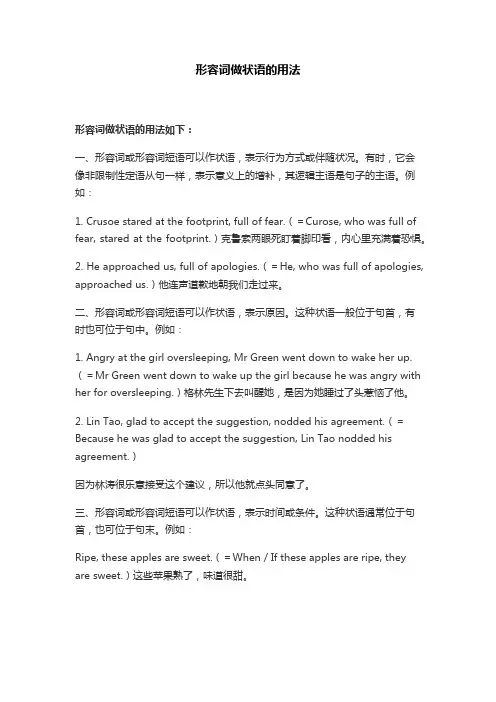
形容词做状语的用法形容词做状语的用法如下:一、形容词或形容词短语可以作状语,表示行为方式或伴随状况。
有时,它会像非限制性定语从句一样,表示意义上的增补,其逻辑主语是句子的主语。
例如:1. Crusoe stared at the footprint, full of fear.(=Curose, who was full of fear, stared at the footprint.)克鲁索两眼死盯着脚印看,内心里充满着恐惧。
2. He approached us, full of apologies.(=He, who was full of apologies, approached us.)他连声道歉地朝我们走过来。
二、形容词或形容词短语可以作状语,表示原因。
这种状语一般位于句首,有时也可位于句中。
例如:1. Angry at the girl oversleeping, Mr Green went down to wake her up.(=Mr Green went down to wake up the girl because he was angry with her for oversleeping.)格林先生下去叫醒她,是因为她睡过了头惹恼了他。
2. Lin Tao, glad to accept the suggestion, nodded his agreement.(=Because he was glad to accept the suggestion, Lin Tao nodded his agreement.)因为林涛很乐意接受这个建议,所以他就点头同意了。
三、形容词或形容词短语可以作状语,表示时间或条件。
这种状语通常位于句首,也可位于句末。
例如:Ripe, these apples are sweet.(=When / If these apples are ripe, they are sweet.)这些苹果熟了,味道很甜。
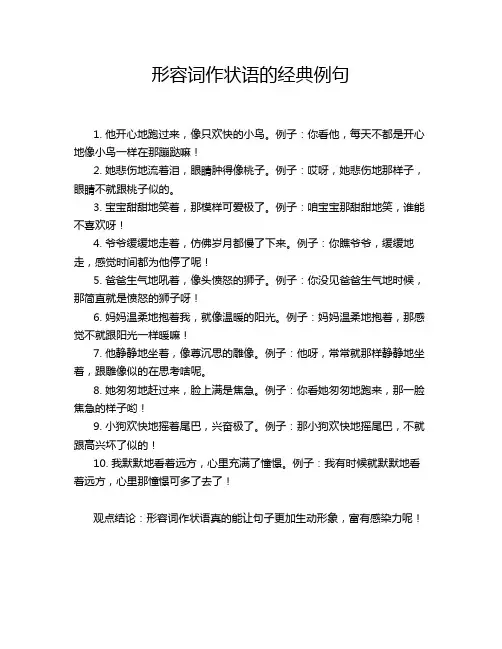
形容词作状语的经典例句
1. 他开心地跑过来,像只欢快的小鸟。
例子:你看他,每天不都是开心地像小鸟一样在那蹦跶嘛!
2. 她悲伤地流着泪,眼睛肿得像桃子。
例子:哎呀,她悲伤地那样子,眼睛不就跟桃子似的。
3. 宝宝甜甜地笑着,那模样可爱极了。
例子:咱宝宝那甜甜地笑,谁能不喜欢呀!
4. 爷爷缓缓地走着,仿佛岁月都慢了下来。
例子:你瞧爷爷,缓缓地走,感觉时间都为他停了呢!
5. 爸爸生气地吼着,像头愤怒的狮子。
例子:你没见爸爸生气地时候,那简直就是愤怒的狮子呀!
6. 妈妈温柔地抱着我,就像温暖的阳光。
例子:妈妈温柔地抱着,那感觉不就跟阳光一样暖嘛!
7. 他静静地坐着,像尊沉思的雕像。
例子:他呀,常常就那样静静地坐着,跟雕像似的在思考啥呢。
8. 她匆匆地赶过来,脸上满是焦急。
例子:你看她匆匆地跑来,那一脸焦急的样子哟!
9. 小狗欢快地摇着尾巴,兴奋极了。
例子:那小狗欢快地摇尾巴,不就跟高兴坏了似的!
10. 我默默地看着远方,心里充满了憧憬。
例子:我有时候就默默地看着远方,心里那憧憬可多了去了!
观点结论:形容词作状语真的能让句子更加生动形象,富有感染力呢!。
形容词作状语现代汉语
1. 开心地笑着现代汉语,就像那阳光灿烂地照耀着大地。
比如:“他开心地笑着跟我说着好玩的事儿,那模样,就像春天里绽放的花朵一样美!”
2. 悲伤地哭泣现代汉语,仿佛整个世界都变得灰暗了。
例如:“她悲伤地哭泣,那哭声,就像刀子一样刺痛我的心。
”
3. 愤怒地喊着现代汉语,好似火山爆发一般吓人。
像:“他愤怒地喊着,那气势,简直就像要把房子都震塌了!”
4. 温柔地说着现代汉语,宛如春风轻轻地吹拂。
比如:“妈妈温柔地说着故事,那声音,如同潺潺的溪流般悦耳。
”
5. 兴奋地跳着现代汉语,恰似孩子得到了最心爱的玩具。
例如:“她兴奋地跳着,那劲头,不就像中了大奖一样嘛!”
6. 无奈地叹着现代汉语,好像面对无法解决的难题。
像:“爷爷无奈地叹着气,那神情,真让人觉得心疼啊。
”
7. 焦急地等着现代汉语,仿若热锅上的蚂蚁。
比如:“他焦急地等着她的消息,那着急的样子,难道不像在等救命稻草吗?”
8. 幸福地笑着现代汉语,仿佛拥有了全世界。
例如:“他们幸福地笑着,那笑容,不就是爱情最美的模样吗?”
9. 骄傲地挺着现代汉语,好似自己是最了不起的人。
像:“他骄傲地挺着胸膛,那模样,是不是特别滑稽?”
10. 静静地看着现代汉语,如同时间都停止了。
比如:“她静静地看着远方,那画面,真的好美,好让人心动啊!”
我的观点结论:形容词作状语在现代汉语中真的太有表现力啦,可以让我们的语言更加生动、形象、富有情感!。
用形容词作状语翻译下列句子:1.饥寒交迫,那个小女孩不住地哭泣。
2.长途国外旅行之后,他精疲力竭地回到了家。
3.他谦逊、开朗,使大家很快就一点也不紧张了。
4.在我回家的途中,我看到一个中年男子躺在路边,烂醉如泥。
5.回答不出老师的问题,学生们都保持沉默。
6.又怕又冷,时光旅游者踏上了回到现在的旅程。
1.Cold and hungry, the little girl kept crying.2.After the long journey from abroad, he got home , tired/ tired out/worn out.3.Modest and easy-going, he soon put everyone at ease.4. On my way home, I saw amiddle-aged man lying by the roadside , blind drunk./ very drunk.5.Unable to answer the teacher’s question,all the students kept silent.6.Scared and cold, the Time Traveller starts back towards the present.Scared and cold,the Time Traveller starts back towards the present.又怕又冷,时光旅游者踏上了回到现在的旅程。
scared, cold 是形容词作伴随状语。
表示主语实施谓语动作时伴随的状态。
He was lying in bed, awake, listening to the rushing winds. They broke into the bedroom and found the man lying on the floor, dead.Crusoe stared at the footprint, full of fear.形容词与分词作状语的关系:1.形容词做原因状语,有无being区别不大:Afraid of being caught,the thief hid himself under a bed. Curious about everything,We lookaround. Unable to answer the question,the students keep silent.Being poor,he couldn't afford a TV set.(现在分词做原因状语)Poor,he couldn't afford a TV set. (形容词做原因状语)Being ill, I stayed at home.(现在分词做原因状语)Ill, I stayed at home(形容词做原因状语)但过去分词做原因状语时不可加being表示状态,加being表示正在进行的动作:Made of glass, the cup is fragile. Caught in the rain, he got wet all over.Lost in thought, he almost ran into the car in front.Being interviewed by the reporters, the manager has no time to see you.2.形容词做时间状语, 不可以加being。
形容词作状语状语多数情况下由副词、介词短语及非谓语动词(现在分词、过去分词及不定式等)充当。
形容词作状语的情况相对比较少见,多用于表示原因,让步,方式,伴随动作或评注等。
1.形容词作状语时的位置比较特殊。
一般来说,要么位于句子的前端,要么位于句子的末端,并常用逗号分开。
Young in year, he is old in experience. 他虽然年轻,却很有经验。
(让步状语)Full of enthusiasm, they make great progress each day. 他们充满热情,每天进展神速。
(原因状语)She gazed at him,silent for a moment. 她疑视着他,静默了片刻。
(方式状语)She hurried up the steps,nervous and pale. 她勿忙走上台阶,神情紧张,脸色苍白。
(表伴随动作)More important, education must be in line with the requirements of our growing economy.更重要的是教育事业必须同经济发展需求相适应。
(评注状语)2.有时形容词作状语还可以插入在主语后边,如:The girl,amazed at the sight, didn't know what to say. 那姑娘看到这景象后很惊讶,不知道说什么。
3.形容词作状语也可以直接位于动词后,如:Many poets died young. 许多诗人英年早逝。
He said nothing but sat silent smoking. 他什么话也没说,只是静静坐在那里抽着烟。
1. ,这个还挺常见的Right or wrong, there could be no going back. 无论对错,都没有回头路。
To experience new emotions, good and bad, we have to climb the mountains, and swim the ocean. 为了体验新的情绪,无论是好的还是坏的,我们必须爬上高山,游过海洋。
形容词做状语的用法形容词用作状语主要表示原因、结果或伴随等,其逻辑主语必须与句子主语保持一致。
这类结构通常可用从句或并列句来改写:He came over, eager to help. / He came over and (he) was eager to help.他走过来,急于想帮忙。
形容词用作状语的三种类型类型一:说明性状语形容词的主要功能是用作定语和表语,但有时也可用作状语(有人也称之为主语补足语,因为它们是补充说明主语的)。
如:He lay in bed, awake. 他躺在床上,没有睡着。
(表伴随)He arrived home, hungry and tired. 他回到家里,又饿又累。
(表结果)Unable to afford the time, I had to give up the plan. 由于抽不出时间,我不得不放弃这个计划。
(表原因)形容词用作状语的特点是,该形容词的逻辑主语就是句子主语,并且通常可以用并列句或主从复合句来改写。
如以上各句可改写为:He lay in bed and he was awake.He arrived home and he was hungry and tired.Because I was unable to afford the time, I had to give up the plan.类型二:程度状语有少数形容词,如red, boiling, freezing, icy, bitter等,它们在某些搭配中可以起副词,用作状语,表示程度,意为“很”“非常”等。
如:The stove was red hot. 火炉是炽热的。
It’s boiling hot. 它是滚烫的。
His face was bright red. 他的脸是鲜红的。
The weather is freezing [icy, bitter] cold. 天气冷极了。
形容词做状语的列句1. 形容词做状语可厉害啦,就像小魔法师在句子里施魔法一样。
比如说“他高兴地跳了起来”,“高兴”这个形容词在这里做状语,把他跳起来时候那种开心的情绪一下子就表现出来了。
你想啊,如果没有这个“高兴地”,就只是“他跳了起来”,那多干巴巴呀,完全体现不出他内心的喜悦。
这就好比做菜没放盐,淡而无味呢。
2. 形容词做状语超级有趣。
像“她难过地哭了”,“难过”这个词一放在这儿做状语,整个画面感就出来了。
你能想象到她哭的时候那伤心的模样。
要是只说“她哭了”,就好像一个没有色彩的画,你根本不知道她哭是因为开心还是难过。
这是不是就像你只看到一个人在笑,却不知道他是真心高兴还是苦笑呢?3. 形容词做状语啊,那可是相当有表现力的。
“小猫警惕地看着周围”,这里“警惕”做状语。
小猫那种小心翼翼、充满戒备的状态是不是一下就到你眼前了?要是没有“警惕地”,就成了“小猫看着周围”,这就像你看东西的时候没戴眼镜,模模糊糊的,根本看不清小猫当时的状态。
4. 嘿,形容词做状语就像给句子加了特效一样。
“妈妈温柔地抚摸着我的头”,“温柔地”这个状语,让妈妈的动作充满了爱意。
要是没有这个词,就变成“妈妈抚摸着我的头”,这就好比一杯热咖啡没有了香气,平淡无奇。
你能感受到这其中的差别吗?5. 形容词做状语可真是个神奇的存在。
“他愤怒地吼叫着”,“愤怒”做状语的时候,你都能感觉到他那满腔的怒火。
要是只说“他吼叫着”,你肯定会疑惑,他为什么吼叫啊?是生气还是在玩闹呢?这就像你听到一个声音,却不知道是从哪儿发出来的一样让人摸不着头脑。
6. 形容词做状语的作用可不小呢。
你看“小鸟欢快地歌唱”,“欢快”做状语,小鸟那快乐的样子仿佛就在眼前。
如果没有“欢快地”,就成了“小鸟歌唱”,这就好像一首没有节奏的歌,完全没有那种欢快的氛围了。
你说是不是这个理儿?7. 形容词做状语就像给动作涂上了颜色。
“孩子们兴奋地奔跑着”,“兴奋”这个状语,让孩子们奔跑的场景充满了活力。
形容词充当状语的例子
一、形容词充当状语的例子
1、快乐地:张老师快乐地给我们讲课,大家都很开心。
2、激动地:像只小猴子一样,刘明激动地跳起来。
3、幸福地:老人们坐在椅子上,幸福地笑着说话。
4、玩味地:小孩子玩味地看着树上的小鸟。
5、高兴地:在池塘边,孩子们高兴地捉泥鳅。
6、凝重地:小李凝重地蹲在丰碑前,向英雄们致敬。
7、温柔地:母亲温柔地抚摸着我的头发。
8、内疚地:他不好意思地低着头,内疚地摸着自己的脸。
9、害怕地:受惊的小狗害怕地蹲在角落里。
10、冷漠地:他冷漠地看着我们,不回应任何相关的话题。
形容词做状语
作原因状语,通常位于句首。
1.Thirsty and eager to ger a little rest, she went into the restaurant and seated herself at a littl table by the window
2.Afraid of difficulty, he prefers to do the easy maths problem.
3.Being ill, I stayed at home.
4.Lost in thought, he almost ran into the dar in front.
时间、条件状语
1.Enthusiastic, they make good students
2.Ripe, these apples are sweet
3.You had better eat vegetables fresh
作让步状语
1.Every nation, big or small, should be equal.
2.Right or wrong, I'll stand by you.
伴随状语
1.They started the experiment, hopeful for success
2.After his journey from abroad, Richard Jones returned home, exhausted
3.The lost boy spent three days in the forest cold and hungry.
4.The thief hid himself in the corner, afraid of being caught
5.Excited and overjoyed, the children rushed to the front.
有些形容词如strange, funny, curious, odd, important,
surprising, remarkable等作状语时,表示的是评注性的说明是说话人的看法、态度和评价,前面可以加more或most作评注性状语,。
1.Curious, the result turned out that way.真奇怪,结局竟然是那样
2.More remarkable, he has made a breakthrough in his research.
ex.
1.______, some famous scientists have the qualities of being both careful and careless
A. Strangely enough
B. Enough strangely
C. Strange enough
D. Enough strange
2. ______and happy, Tony stood up and accepted the prize.
A. Surprising
B. Surprised
C. Being surprised
D. To be surprised.
3.______ in the mountains for a week, the two students wre finally saved by the local police. (lost)
1._____, we couldn’t fall sleep. (excited/excitedly)
2.We waited ____________(excited/excitedly) for the coming of the new year.
3._________, we will be there by dinner time. (Hopeful/Hopefully)
4._________, the boss didn’t praise me for help a disabled boy.( Surprising/
Surprisingly)
5.__________, I went out without any word.(surprised,surprisedly)
6.. ____ enough, some famous scientists have the qualities of being both careful
and careless. ( Strangely/Strange)。